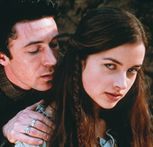 "Driven
by Romance"
"Driven
by Romance"By R. D. Heldenfels; "Amelia Warner is Lorna and Adian Gillen is the evil Carver Doone"
 "Driven
by Romance"
"Driven
by Romance"
By R. D. Heldenfels; "Amelia Warner is Lorna and Adian Gillen is
the evil Carver Doone"
Blackmore tale of star-crossed love comes to television Sunday on A&E
In her introduction to the Oxford World's Classics edition of Lorna Doone, literary scholar Sally Shuttleworth almost immediately gets to the contradictory impressions R.D. Blackmore's 1869 novel generates. On the one hand, Shuttleworth noted, the men of Yale University in 1906 voted it their favorite novel. On the other, the book is considered "one of the formative texts of adolescent female reading.''
Of course, Shuttleworth adds that young women encountered the book ``often in abridged versions,'' and things begin to make more sense -- especially when it came time to adapt the novel for a new television version. The novel -- about a young English farmer, John Ridd, and his seemingly star-crossed love for Lorna -- is more than 600 thickly printed pages of intrigue, romance, class consciousness and heavy sentences.
Try this one: "My father being of good substance, at least as we reckon in Exmoor, and seized in his own right, from many generations, of one, and that the best and largest, of the three farms into which our parish is divided (or rather the cultured part thereof), he, John Ridd, the elder, churchwarden and overseer, being a great admirer of learning, and well able to write his name, sent me his only son to be schooled at Tiverton, in the county of Devon.''
I know, you're dashing to the library for a copy right now.
Maybe Yalies like that sort of thing, or were drawn to Blackmore's message about the nobility of the farming class and the decadence of the aristocracy. As Shuttleworth writes, "Set in the seventeenth century, LornaDoone none the less dramatizes the crucial issues of the Victorian era: country is set against city, and the values of individualism against the intrusions of the State.''
But underneath that, set free in abridged versions, is a romance so implausible that it is sure to feed into adolescent fantasies, especially those of girls who dream that their common existence is an accident, and that nobility and true love await.
And it's romance that drives a streamlined and modified three-hour version of Lorna Doone premiering at 8 p.m. Sunday on A&E.
Richard Coyle stars as Ridd, with Amelia Warner as Lorna. They form a triangle with the evil Carver Doone, played by Aidan Gillen -- "an intense emotional triangle,'' script writer Adrian Hodges has said. "I felt their needed to be a genuine edge to their relationships, slightly more so than in the book..."
"Blackmore was a man of his times, a Victorian of the late 19th century,'' Hodges says in news media notes for the movie. "He wrote his heroes and heroines with all the key virtues and values that his readers would have liked at the time. What we have had to do is reassess these characters so that a 21st-century audience can connect with them.''
The connection begins when young John's father is killed by a band of the Doones, an aristocratic family that uses violence and social connections to protect their domain and terrorize the people around them. The Ridds hate the Doones, but years later, John encounters young Lorna and pretty much falls in love on the spot.
But John is not Lorna's only suitor. Young Carver intends to marry her, since he knows that Lorna has An Important Secret that could change the future and fortunes of the Doones. Besides, he's obsessed with her. But Lorna loves only John, through conflict and revolution and even a bloody wedding day.
The production looks reasonably good. Coyle and Warner, though, are weak -- a bit too soft and modern for a story set in the 17th century -- while Gillen is a virtual mustache-twirler in his villainy. The pleasures lie with other characters and other scenes, especially the few where a world-weary judge (ably played by Michael Kitchen) steals the show.
Some of Hodges' changes make sense, especially in the climactic confrontation between Carver and John, which is almost laughable on the page and would be more so on the screen. But even at its core Lorna Doone is a faintly ridiculous fantasy brightened mainly by beautiful countryside.